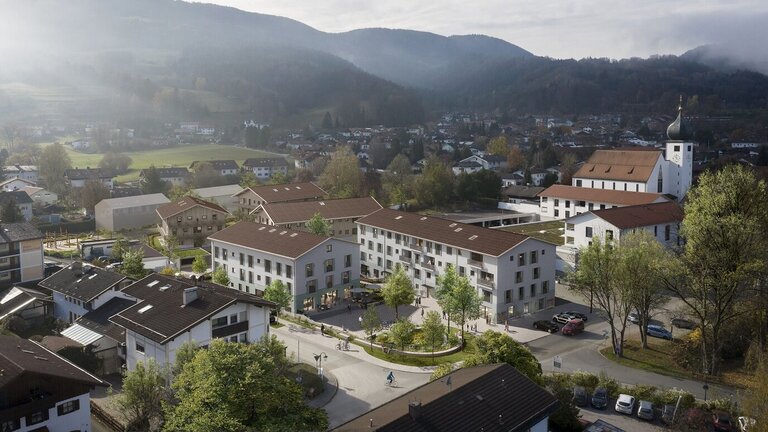Rosenheim, Germany, 5 July 2021. Upgrading the town center and creating tangible added value for the people who live there – that is the stated aim of the Tannenhof neighborhood development in Bad Feilnbach. To achieve this, the Bavarian town involved its citizens in a wide-ranging participation procedure. The result is impressive: in addition to affordable housing, the building project focuses on sustainability and the social character of the new neighborhood. Quest AG has been responsible for the project, and Stuttgart-based planning and consulting company Drees & Sommer SE is supporting its realization.
Construction work will continue until 2023, when the Tannenhof will be ready for its new residents. The neighborhood will accommodate 50 residential units, an assisted senior living community, a two-group child-care center, two worklabs, and rooms for the neighborly helping hand. When drawing up the development plan, Quest AG followed the findings of the public participation procedure extremely closely and designed the Tannenhof on a sustainable and functional basis, with social interaction aspects in mind.
The houses in the Tannenhof will be connected to a woodchip power plant owned by the town of Bad Feilnbach. This is much better for the environment compared to fossil fuels, and the added value is also obtained in the region. ‘We get the wood from foresters in the area. It only comprises forest residue. This accumulates, for example, after forest clearing or management activities, or bad weather such as storms,’ said Bad Feilnbach’s Mayor Anton Wallner. He explained that generating heat with woodchips is CO2-neutral. Forests bind CO2 which is released again during combustion. Households are supplied through a local heating network with intelligent control. This provides apartment owners with renewable, climate-friendly energy.
To ensure that the neighborhood can be completed on schedule and within budget, all the cogs on the construction site have to mesh properly. Drees & Sommer experts rely on lean construction management (LCM) in a complex project of this nature, to avoid delays, reworking, unnecessary waiting times, and wastage of labor and materials. The key element is a detailed project progress plan that is scheduled exactly to the day. It is then clear throughout the process how many employees, which materials and which machines are needed at which times. For the Tannenhofin Bad Feilnbach, this means reliability, resource savings and motivated employees.
